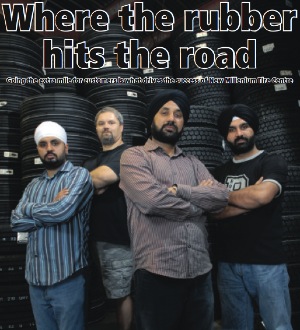In an age of technological ease, socially accepted incompetence, and a media-inflated sense of personal entitlement, inspiration to do business can be hard to find.
After all, who needs a good work ethic when respect is to be demanded rather than earned? When mediocrity (or worse) isn’t the exception but the norm? When computers are lulling us into literally lifting nothing but a finger?
Take heart, tire dealers. In this often-uninspiring age – an age also marked by considerable anti-immigrant sentiment – Tire Review found new inspiration in the old-as-history stories of, yes, recent immigrants.
They’re classic stories of hard work, sacrifice, adventure, tenacity and success. And they’re current stories that originate in all corners of the world, from the Middle East to South America, from the former Soviet Union to India, and even from the one country that early Americans left to form their own: England.
Tire Review interviewed five diverse entrepreneurs who left their homelands, often with little money and even less English words in their vocabularies, to ultimately establish successful tire businesses in North America. Their accounts offer lessons not only in business, but in living.
They are truly inspiring.
And, by the way, look for the one concept that all of the entrepreneurs share, independently cited in varying words, as a favorite philosophy by which to live and work. It might provide readers with some, well, “golden” opportunities of their own.
DEWAN PRASHAD – GUYANA
Moving from the South American republic of Guyana to Columbia might not seem like much of a leap – unless the Columbia in question is Columbia, Illinois.
“When we moved to Columbia, the town was 99.75% Caucasian and .25% my family,” jokes Dewan Prashad, president of Columbia Firestone in the St. Louis metropolitan area. “We were the only people of color in my town, and that was not an exaggeration. There were, of course, some cultural issues with those who initially didn’t want us. Very quickly, however, the community rallied around my family, and I knew that we had something special here. I now tell everyone in our town that I’m a sun-tan German.”
Prashad’s sense of humor may be the entertaining flipside of the tenacity that created his success. The 59-year-old entrepreneur worked as a teacher in his tropical homeland, but says he “wanted more from life.” So, he immigrated in 1971 to study medicine, later graduating from a school for medical and dental assistants and continuing his education at City College of New York.
“It was culture shock,” he says of his arrival in New York City. “When all you knew in Guyana were Indians and those of African descent, going to a place as vibrant as Brooklyn was a challenge. The people. The accents. The fast pace of life.”
Prashad’s career track took him through jobs in the trucking and railroad businesses that eventually led him to greater St. Louis. But those jobs required more travel than he was willing to undertake when his two sons grew increasingly active in sports and academics.
“My wife and I decided it was time for something new,” he says matter-of-factly. “I saw the need for a good auto repair facility in our town and proceeded to bring that to fruition. I studied several shops and even paid an independent shop owner to work for him for a week so I could learn the business.” Prashad opened Columbia Firestone in 1992.
“It was hard work and dedication that made my store a success over these last 20 years,” Prashad admits. “Frankly, I don’t give up. I have always had the entrepreneurial spirit, ever since setting foot in the U.S.A. I wanted to make something of myself, and I wanted to give my family and children so much more than I ever had. I knew that businesses could fail, but I also knew that – through hard work, dedication and sometimes a little luck – I could make something out of just a small patch of land in a growing town.”
Since starting the business, Columbia Firestone has grown from four to nine employees and now utilizes state-of-the-art equipment, Prashad says. He attributes that growth largely to the dealership’s good positioning in his community.
“Because we have done so much work with charity, Columbia Firestone has become known as a friend to the community as well as a local leader,” he says. “The tire business is a community business. Know your environment. Know your equipment. Know that 16-year-olds will buy a used car and their parents will want to make sure that they have the safest tires on the road. And make sure you give back.
“Just treat people like you want to be treated,” he adds.
As for his best advice, Prashad takes a carpe diem approach. “You came here to the land of opportunity,” he tells other immigrants. “Seize it! If you’re strong, smart and capable, your opportunities are boundless. If you can’t make it here, then it’s time to start praying.”
SPENCER CARRUTHERS – ENGLAND, BAHRAIN, SOUTH AFRICA
Inheriting a family business may be a matter of predestination, but inheriting the in-laws’ business – especially as an industry newbie and an immigrant – is clearly a freewheeling case of free will.
That’s just the kind of adventure that Spencer Carruthers was raised to experience.
Born in the Swingin’ Sixties to parents whom he calls “travelers,” Carruthers moved from his native England to the Persian Gulf island of Bahrain and again to Cape Town, South Africa, all by the time he was 14. Early exposure to various cultures, he says, gave him the people skills that he considers crucial to being a successful entrepreneur. “Growing up in different countries, traveling the world, I’ve met so many great people and learned from them,” he says.
But Carruthers’ global experience didn’t always ring like a rousing chorus of “We Are the World.” After high school, he served a mandatory two-year “national service” during the height of Apartheid, leaving him disillusioned by conditions in South Africa. So, in 1988, he moved back to his native England to study construction management. And there, across the proverbial pond, he met his American wife, Holly.
“I needed money,” he recalls of his earliest days in the states, in 1992, with his Bostonian girlfriend. “So I painted Holly’s father’s tire store and, after we got married, worked as a tire changer there. Then her father became sick and the family didn’t know what to do. None of the kids wanted anything to do with (the business), but the opportunity was there.”
That’s when Carruthers began his adventure as owner of Kenwood Tire Company in West Bridgewater, Mass., officially buying the business with Holly in 1995.
“I knew nothing about tires or cars,” he says, though he now cites cars, along with sports, as among his favorite areas of Americana. “But I met good people and mentors, and I religiously read all the trade magazines and joined tire dealer associations.” Kenwood Tire now is a $1.2 million business, with five employees and three bays.
“In the tire and auto business, you need to be a people person,” he reiterates of his long-ingrained skill. “But you also need to give a good impression. You need to provide a unique experience so everyone feels special in some way. Treat your customers as you would want to be treated.
“In English, there are many different ways of saying that same thing about showing a little respect,” he adds.
Not everyone with good people skills, however, is capable of accomplishing what Carruthers has. His tenacity, evidenced in his reluctance to list any negative experiences or obstacles on his path to success, is another important component.
His advice to immigrants and tire entrepreneurs, therefore, isn’t very surprising: “Don’t let fear hold you back if you have a dream.”
INDERJIT “ANDY” DHUGGA – INDIA
Harmless as a turban is, the headdress has become a symbol steeped in prejudice – even against cultures not associated with the targeted ethnicities. It’s a prejudice that Inderjit Dhugga, CEO of New Millennium Tire Centre in Brampton, Ontario, has largely overcome.
“We’re of Sikh faith and wear turbans,” says the 42-year-old native of India’s northern state of Punjab. “It was, and still can be, very difficult to change the arrogance of people who don’t understand the religion. But, for the most part, Canadians are good people and have embraced multiculturalism in this country.”
Just as importantly, Dhugga has embraced Canada. He chose to leave India as a soccer-playing college student amidst the violence that erupted there in 1984, following the assassination of Prime Minister Indira Gandhi. His parents, he says, supported his monumental decision to immigrate to Canada in 1989.
“I missed my homeland very much when I first arrived,” Dhugga recalls. “There is a huge difference in lifestyle. I quickly realized that I would have to update my credentials in order to succeed here.”
And that, he did. Dhugga, a mechanically-inclined lover of cars, trucks and machinery, always had a knack for building and repairing, he says. So he followed that inclination into the tire business.
“Once I knew I wanted to learn the truck tire industry, I worked for free, for six months, in a tire shop so I could understand the business and have hands-on training at the same time,” he says. “Hard work always pays off. Nothing comes easy, but if you put your passion into your work, there is no limit to the rewards to be had, both personal and financial.”
Dhugga’s rewards have been considerable. He started New Millennium in 1999 with one service truck, a rented storage unit and one tire brand. Now, the carrier of six brands has six locations, including in Montreal, Windsor, Edmonton and Calgary. And Dhugga says his company is even expanding into manufacturing this summer.
“(You have to) educate yourself about tires, have good communication skills, have good business knowledge, and serious financial backing,” he advises. “Last but not least, you have to have a hard-working mindset. In this industry, honesty and integrity will get you far.”
In the case of Dhugga’s dealerships, that has meant keeping long hours, seven days a week, and providing around-the-clock roadside assistance. It also has required the implementation of “the best pricing and better service,” which Dhugga believes results in word-of-mouth advertising.
“My motto,” explains the dealer in the turban, “is to treat others the way you would like them to treat you. And that’s brought me a long way.”
ANATOLY “TONY” GERMAN – BELARUS, USSR
“I didn’t pick the tire industry,” admits Tony German, claiming it offered the only job that a non-English-speaking 48-year-old male could find. “It chose me.”
Lucky for him. The business that German started in 1994 with $5,500, after getting fired from another tire dealership, grossed $5.5 million in 2010. And now, German says, Tony’s Tires and Wheels in Albany, N.Y., continues to grow “as fast as money will allow me” – despite economic downturns.
German’s unlikely success did indeed arrive through doors of good fortune that opened after less fortunate ones closed. The 68-year-old native of Belarus, part of the former Soviet Union, says he had a good job as a general supply manager for a large iron-casing manufacturer there. But he and his family were living that good life just 45 miles away from Chernobyl, site of the 1986 nuclear power plant meltdown considered to be the worst in history.
“I thought it would be safer at the time for my family and small children to move to a place with no radiation,” German says. So, in 1989, three years after the disaster, he and his family immigrated to Albany, where some of German’s extended family members already lived.
“I did not speak a word of English,” he says, “and, for six months, I could not get a job. After six months, at the age of 48, I got a job as a tire technician, earning $6 per hour. After six more months, I got a raise to $8. I was always very ambitious and was not afraid to work hard to provide for my family.”
Following his ultimately fortunate firing from that company, German scraped up his five grand, drew from the lessons of his past jobs and relied on his work ethic to make his millions. “I was very well educated in Russia and had work experience that allowed me to prosper in America,” he says. “I knew how to run a business from working in a large factory.
“I also try not to be an ***hole and try to treat everyone fairly,” he jokes. “I treat my employees really well and they stay loyal and work hard for me in return. I’m a man of my word, and people trust me and know I have a big heart.”
Not that German is offering advice, of course, at least not to other immigrants. “Immigrants do not need advice!” he states. “They already know how to work hard and come to this country seeking opportunities. They already have the ambition. Hard work and honesty get you far in life. Happiness comes from hard work, and success doesn’t happen overnight.”
But if the blunt Belarusian had to offer one tidbit of advice to potential tire entrepreneurs, it would be an unexpected one. “Don’t do it!” he says. “Manufacturers are making it very difficult for a small business to survive in this industry.”
Not that it ever could have stopped Tony German.
SARKIS SEPETJIAN – LEBANON
For a man who once considered joining a seminary, dealing with war in his native Lebanon was a matter of faith.
“I believe faith has had a dramatic effect on my station in life,” says the 56-year-old president of Turbo Wholesale Tires in Los Angeles. “My parents instilled in me the values that I have today, (including) the belief that if something falters or fails in my life, a new door of opportunity would open.”
That’s what happened when Sepetjian, of Armenian heritage, and his cousin traveled to Greece in 1976 after the war with Israel escalated in his part-Christian, part-Muslim homeland. The two planned to seek employment there, with Sepetjian landing a job in a shoe factory. Soon, he began exporting shoes to Lebanon, as well as women’s clothing.
“The business was very successful, so I decided to come to the United States and expand my business,” he says of his immigration in 1982. “When I arrived, I had $3,000 in my pocket and the rest of my capital tied up in women’s clothing. Unfortunately, I discovered very similar styles of clothing were being imported from China, sold at half the price. I liquidated my inventory at a fraction of my cost and looked for a job.”
Discouraged but still reliant on faith, Sepetjian accepted an offer from a family friend to “keep an honest eye on things” at the friend’s two retail tire shops, one of them called Turbo Tire. By 1987, Sepetjian had become the owner, incorporating the company himself as Turbo Wholesale Tires.
“At that time, gas stations stopped carrying their own company tires, so there was a rare and unique opportunity,” he explains. “Still, business was very difficult, but many of the immigrant gas station owners referred their friends and relatives to me, and my business grew.
“At first, the established mainstream independent tire dealers in L.A. didn’t know what to make of me,” he continues. “I decided to visit them and tell them how I could help grow their businesses with the rapidly emerging UHP and SUV segments of our industry. I initially was met by rejection but, eventually, many of these established independents started buying from me. By focusing on the high-performance niche, these dealers discovered I had the proper tire they needed for their specific application.”
Since that time, Sepetjian has added several tire brands, opened increasingly larger warehouses (most recently settling into a new 290,000-square-foot warehouse with 96 dock doors) and watched business soar. After just a few years in business, he says, Turbo had become a $7-million company. In 2002, after opening a larger warehouse in Irwindale, Calif., sales surpassed $49 million. Last year, the figure grew to $135 million, with expectations of reaching $200 million this year.
“Even though I have been blessed with tremendous success, I have always been humble, which I attribute to my faith and the values my parents instilled in me,” he says. “I have never forgotten my roots, or how others have helped me, so I try to support others in need, even when they are in trouble.”
As for passing on his well-earned wisdom, Sepetjian offers these tidbits of advice: “Always look for new opportunities and surround yourself with a good team. Treat all employees and customers with the same respect you would expect for yourself. Believe in yourself and your vision. Work hard, sacrifice and never lose faith in yourself.”













